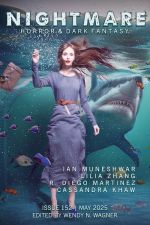“Beak” by Ian Muneshwar
“Blood of the Idugan” by Lilia Zhang
“Notes from the Graft Failure” by R. Diego Martinez
Reviewed by Victoria Silverwolf
In the novelette “Beak” by Ian Muneshwar, a woman’s apartment is infested with bedbugs. The landlord demands that she capture a live specimen before summoning an exterminator. She sneaks into a neighbor’s room in search of one, but instead discovers the neighbor’s granddaughter secretly living in the attic. Their encounter leads to a changed relationship with the creatures.
The story takes place during the COVID-19 pandemic. The mask the woman wears and her social isolation appear to be thematically related to the way the bedbugs parasitize her body, as if they supply a perverse kind of connection to others. The way the plot plays out once the neighbor’s granddaughter appears may not be surprising, but the author supplies visceral descriptions of the woman’s physical sensations.
“Blood of the Idugan” by Lilia Zhang combines themes from European fairy tales, particularly the story of Sleeping Beauty, with a setting that is a mythical version of ancient Asia. The narrator is summoned by an emperor to be one of his concubines. In response to a good deed performed by the emperor’s daughter, the narrator uses her magic powers to save the daughter after she suffers his abuse.
The author makes use of familiar tropes such as the magic mirror, the poisoned apple, and the glass coffin in creative ways. The style is elegant, but in a way that is somewhat distancing. The result is a story more to be admired than loved.
The narrator of “Notes from the Graft Failure” by R. Diego Martinez has his brain separated from the rest of his body. The self-hating and self-pitying brain briefly experiences an emotional connection with a woman who comes to visit him, while the body, hiding from authorities, lives the existence of a wild animal.
The title suggests inspiration from Fyodor Dostoevsky’s famous novella “Notes from Underground,” and an interview with the author confirms this. Despite this literary allusion, and the story’s consideration of the classic philosophical conundrum of mind and body, the premise is likely to remind readers of campy B movies such as The Brain That Wouldn’t Die. The contrast between lofty aspirations and lowbrow entertainment is disconcerting.
Victoria Silverwolf has seen The Brain That Wouldn’t Die.
 Nightmare
Nightmare